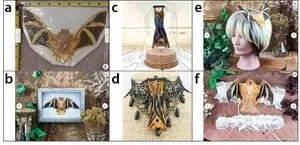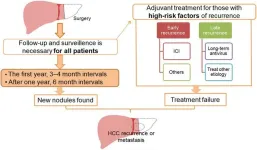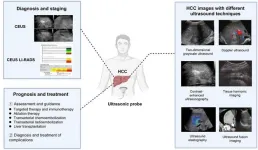(Press-News.org) LA JOLLA, CA—Alzheimer’s disease, the most common type of dementia, currently affects twice as many women as men, with minority populations predicted to witness the most significant increase in cases in the coming years, according to the Centers for Disease Control and Prevention.
Disturbances in sleep are well-known in dementia but have previously been explained as an outcome of the disease, not the cause. Increasing evidence, however, now implicates sleep disturbances with the development of dementia.
In a bid to better understand the relationship between sleep and cognitive outcomes in women, scientists at the Scripps Research Digital Trials Center have launched the Research Framework for Sleep Health - Neurocognitive Outcomes in Women (REFRESH-NOW) study. The study aims to assess the impact of sleep duration and sleep irregularity on neurocognition in women who are 55 years of age or older through data collected via activity trackers and a smartphone application.
Led by Stuti Jaiswal, MD, PhD, a physician-scientist specializing in sleep research, REFRESH-NOW will use wrist-worn activity trackers and smartwatches to gather longitudinal sleep data over a three year period.
“Wearables have the potential to revolutionize sleep research. While polysomnography is generally regarded as the gold standard for gathering sleep measurements, it only provides a snapshot of a person’s sleep characteristics based on data collected during a night spent in a sleep laboratory,” Jaiswal says. “That tool requires a person be hooked up to many different wires and sensors in a sleep laboratory, which is not a person’s natural sleep environment. On the other hand, commercially available activity trackers collect data passively making it very simple for people to participate in sleep research from the comfort of their own home and to share real-world data with researchers over months or even years.”
The study will use the MyDataHelps mobile app-based platform, which allows participants to sync their activity tracker or smartwatch to share de-identified data such as sleep duration, sleep variability measures, frequency of awakenings and more. Participants who do not own their own device may be eligible to receive a free one through the study.
Scientists will also gather information related to sleep habits, sleep apnea risk and decision-making through surveys available via the app. At multiple intervals, participants will be invited to take part in an at-home cognitive battery assessment designed to allow the study team to gain a better understanding of the participant’s cognitive state and function.
By identifying sleep-related risk factors for cognitive decline, researchers hope to design interventions to improve cognitive outcomes in women.
Participants interested in joining REFRESH-NOW, must enroll in the parent study—REFRESH—which is open to both men and women. Enrollment in REFRESH-NOW is open to women who are 55 or older and living in the U.S.
To lean more, visit refresh.scripps.edu/now.
About Scripps Research
Scripps Research is an independent, nonprofit biomedical institute ranked one of the most influential in the world for its impact on innovation by Nature Index. We are advancing human health through profound discoveries that address pressing medical concerns around the globe. Our drug discovery and development division, Calibr-Skaggs, works hand-in-hand with scientists across disciplines to bring new medicines to patients as quickly and efficiently as possible, while teams at Scripps Research Translational Institute harness genomics, digital medicine and cutting-edge informatics to understand individual health and render more effective healthcare. Scripps Research also trains the next generation of leading scientists at our Skaggs Graduate School, consistently named among the top 10 US programs for chemistry and biological sciences. Learn more at www.scripps.edu.
END
New sleep study aims to understand cognitive decline in women
Scripps Research launches digital trial to identify sleep-related risk factors for Alzheimer’s disease and other dementias using activity trackers.
2024-07-16
ELSE PRESS RELEASES FROM THIS DATE:
Turning agricultural trash to treasure
2024-07-16
In California's Northern San Joaquin Valley, agricultural leftovers such as almond shells, fruit peels, and orchard trimmings can potentially be converted into sustainable bioproducts and biofuels – with the right technology. Today, Schmidt Sciences’ Virtual Institute on Feedstocks of the Future awarded new funding to a group investigating how to make better use of the diverse agricultural waste in the region.
The group, “Building the Circular Bioeconomy in the North San Joaquin Valley” or BioCircular Valley, is co-led by the Department of Energy’s Lawrence Berkeley National Laboratory (Berkeley Lab), UC Berkeley, and BEAM Circular, ...
Adjuvant therapy for hepatocellular carcinoma after curative treatment: Several unanswered questions
2024-07-16
Hepatocellular carcinoma (HCC) is one of the most prevalent malignancies globally and is the third leading cause of cancer-related deaths. The primary curative treatments for HCC are liver transplantation, hepatectomy, and local ablation. However, the recurrence rate of HCC following hepatectomy or ablation remains alarmingly high, up to 70%, severely impacting patient prognosis and overall survival (OS). To mitigate postoperative recurrence and improve patient outcomes, various adjuvant therapies have been explored. Despite the efficacy of several adjuvant treatments in reducing recurrence rates and enhancing survival, ...
Palliative care is underutilized in nursing homes
2024-07-16
INDIANAPOLIS – Palliative care, specialized medical care focusing on providing relief from the symptoms -- including pain -- and the stress of serious illness, is underutilized in nursing homes, despite the large number of nursing home residents living with a serious illness such as cancer, dementia, Parkinson’s disease, heart failure or chronic obstructive pulmonary disease.
A qualitative study, published in the Journal of the American Geriatrics Society, analyzes lack of palliative ...
Understanding others: By age three, we can do this with mirror neurons
2024-07-16
Milan, July 15, 2024 – By the age of three, children are capable of understanding others, "mirroring" those they are with to imitate and anticipate their intentions. They are able to do it thanks to the sophisticated neurofunctional architecture that is necessary to understand others' intentions, the mirror neurons, that result already active at this age.
It’s the result of a study published in the prestigious journal PNAS, led by the collaboration between Giacomo Rizzolatti of the University of ...
Oil and natural gas development in Permian is a key source of ozone pollution in Carlsbad Caverns National Park
2024-07-16
EMBARGO: THIS CONTENT IS UNDER EMBARGO UNTIL 9 A.M. U.S. EASTERN STANDARD TIME ON JULY 16. INTERESTED MEDIA MAY RECIVE A PREVIEW COPY OF THE JOURNAL ARTICLE IN ADVANCE OF THAT DATE OR CONDUCT INTERVIEWS, BUT THE INFORMATION MAY NOT BE PUBLISHED, BROADCAST, OR POSTED ONLINE UNTIL AFTER THE RELEASE WINDOW.
New research shows that ozone concentrations at Carlsbad Caverns National Park frequently exceed Environmental Protection Agency health standards, likely due to oil and natural gas development in the Permian Basin and surrounding region.
The work was led through the Department of Atmospheric Science at Colorado State University and is part of ...
E. coli variant may cause antimicrobial resistance in dogs, humans
2024-07-16
ITHACA, N.Y. – Researchers studying antimicrobial-resistant E. coli – the leading cause of human death due to antimicrobial resistance worldwide – have identified a mechanism in dogs that may render multiple antibiotic classes ineffective.
The paper, which will publish July 16 in the journal Applied and Environmental Microbiology at 9:00am EST, opens up new avenues for therapies to treat both animals and humans – and establishes clinical infections in dogs as a surveillance approach for public health.
The research team analyzed more than 1,000 genomes of the resistant ...
Ultrasonography of hepatocellular carcinoma: From diagnosis to prognosis
2024-07-16
Hepatocellular carcinoma (HCC) is a primary malignancy of the liver and one of the leading causes of cancer-related deaths worldwide. Early detection and accurate diagnosis are crucial for effective management and improved survival rates. Ultrasound (US) technology has significantly advanced and plays a pivotal role in the surveillance, diagnosis, and treatment of HCC. This paper delves into various ultrasound techniques and their clinical applications in HCC management.
Two-dimensional gray-scale ultrasound is a fundamental imaging technique for HCC surveillance. ...
Partisan politics and perceptions of immorality
2024-07-16
Democrats and Republicans overestimate the percentage of people in the opposing party who approve of widely agreed-upon moral wrongs, such as theft or animal abuse, according to a study. Today, Americans hate their opposing political party more than they love their own party, and political animosity and dehumanization of opposing party members have been on the rise for decades. Curtis Puryear and colleagues looked for a “basic morality bias” in social media posts from 5,806 political partisans by searching for words that referencd ...
Should AI be used in psychological research?
2024-07-16
Mohammad Atari and colleagues explore the promise and peril of using large language models (LLMs) in psychological research, beginning by urging researchers to also ask themselves whether and why they should use LLMs—not just how they should use them. The authors caution against using LLMs as a replacement for human participants, noting that LLMs cannot capture the substantial cross-cultural variation in cognition and moral judgement known to exist. Most LLMs have been trained on data primarily from WEIRD (Western, Educated, Industrialized, Rich, Democratic) sources, disproportionately in English. Additionally, although ...
AI makes human-like reasoning mistakes
2024-07-16
Large language models (LMs) can complete abstract reasoning tasks, but they are susceptible to many of the same types of mistakes made by humans. Andrew Lampinen, Ishita Dasgupta, and colleagues tested state-of-the-art LMs and humans on three kinds of reasoning tasks: natural language inference, judging the logical validity of syllogisms, and the Wason selection task. The authors found the LMs to be prone to similar content effects as humans. Both humans and LMs are more likely to mistakenly label an invalid argument as valid when the semantic content is sensical and believable. LMs are also just as bad as humans at the Wason selection task, in which the participant ...
LAST 30 PRESS RELEASES:
Kidney cancer study finds belzutifan plus pembrolizumab post-surgery helps patients at high risk for relapse stay cancer-free longer
Alkali cation effects in electrochemical carbon dioxide reduction
Test platforms for charging wireless cars now fit on a bench
$3 million NIH grant funds national study of Medicare Advantage’s benefit expansion into social supports
Amplified Sciences achieves CAP accreditation for cutting-edge diagnostic lab
Fred Hutch announces 12 recipients of the annual Harold M. Weintraub Graduate Student Award
Native forest litter helps rebuild soil life in post-mining landscapes
Mountain soils in arid regions may emit more greenhouse gas as climate shifts, new study finds
Pairing biochar with other soil amendments could unlock stronger gains in soil health
Why do we get a skip in our step when we’re happy? Thank dopamine
UC Irvine scientists uncover cellular mechanism behind muscle repair
Platform to map living brain noninvasively takes next big step
Stress-testing the Cascadia Subduction Zone reveals variability that could impact how earthquakes spread
We may be underestimating the true carbon cost of northern wildfires
Blood test predicts which bladder cancer patients may safely skip surgery
Kennesaw State's Vijay Anand honored as National Academy of Inventors Senior Member
Recovery from whaling reveals the role of age in Humpback reproduction
Can the canny tick help prevent disease like MS and cancer?
Newcomer children show lower rates of emergency department use for non‑urgent conditions, study finds
Cognitive and neuropsychiatric function in former American football players
From trash to climate tech: rubber gloves find new life as carbon capturers materials
A step towards needed treatments for hantaviruses in new molecular map
Boys are more motivated, while girls are more compassionate?
Study identifies opposing roles for IL6 and IL6R in long-term mortality
AI accurately spots medical disorder from privacy-conscious hand images
Transient Pauli blocking for broadband ultrafast optical switching
Political polarization can spur CO2 emissions, stymie climate action
Researchers develop new strategy for improving inverted perovskite solar cells
Yes! The role of YAP and CTGF as potential therapeutic targets for preventing severe liver disease
Pancreatic cancer may begin hiding from the immune system earlier than we thought
[Press-News.org] New sleep study aims to understand cognitive decline in womenScripps Research launches digital trial to identify sleep-related risk factors for Alzheimer’s disease and other dementias using activity trackers.





